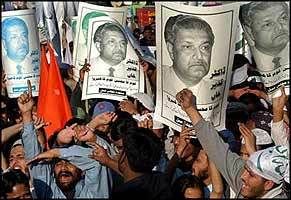More Islamist Worries
 Just when we thought we had the Islamists right where we want them (ha!), there's this from Gregory Scoblete at TCS:
Just when we thought we had the Islamists right where we want them (ha!), there's this from Gregory Scoblete at TCS:Of course, there's not much we can do about this. We're trusting in a president whose hold on power is tenuous in the hope that Islamic secularism can take hold before Islamic jihadism overwhelms it. We want a Turkey in Southern Asia, but a lot of Pakistanis want no such thing.The truth is Pakistan represents a far greater danger to the U.S. than Iran, at least for the foreseeable future. Let us count the ways. Pakistan is a nuclear power. Iran is not. Pakistan has a proven track record of proliferation, including a dalliance with al Qaeda. It was Pakistani nuclear scientists, after all, who met with bin Laden. Indeed, it was a Pakistani scientist, A. Q. Khan, whose black-market network significantly expanded the reach of nuclear equipment and know-how. Meanwhile, Iranian scientists are still laboring to master the basic elements of the nuclear fuel cycle (though progress continues).
Pakistan was one of three countries prior to 9/11 to recognize and provide significant material support to the Taliban - the one regime whose accommodation made 9/11 possible. Iran opposed the Taliban. Elements within the Pakistani military continue to support rump Taliban elements as they battle NATO and U.S. forces in Afghanistan. The New York Times reported that Pakistani army elements have gone so far as to directly fire on Afghan forces (though Pakistan denies it).
Ideologically, Pakistan is vastly more sympathetic to al Qaeda than Iran. Its religious schools preach the extremist variety of Sunni Islam that animates bin Laden's jihad. While Iran's Shiite theocrats preach "death to America," few Iranians have actually embraced the mantra. There are, for instance, 65 Pakistanis in Guantanamo Bay; there are zero Iranians. Unlike al Qaeda, Iran's Shiite proxy Hezbollah has not embraced mass-causality suicide terrorism against American civilian targets. Indeed, Hezbollah's most significant anti-American strike was against a military target 24 years ago: a Marine barracks in Lebanon.
The single most important element, however, is the presence of a reconstituted al Qaeda leadership network in Pakistan. The country plays host (whether willingly or not) to the architects of the largest massacre on U.S. soil in history: Osama bin Laden and Ayman al-Zawahiri. In contrast, Iran reportedly harbors a small number of lesser al Qaeda figures.
Should Pakistan fall, the American left will blame America for it; after all, we shored up Musharraf and forced him to fight the "freedom fighters" along his frontier with Afghanistan. Their natterings would be insignificant compared to the problems a radicalized Pakistan would pose.
The solution is not in isolationism, which would leave Musharraf more exposed, but through greater interventionalism. Intensified trade, covert support of secular elements, more international education ties, joint military and intelligence exercises designed to help Pakistan keep the Islamists out of power, massive U.S. aid following the inevitable next natural disaster to strike the country -- all are essential.
Unlike Iran, we have a foundation to build on in Pakistan. Any newly elected president who sees the global war on terror as a bumper sticker and terrorism as a legal matter, not a military one, will let not be aggressive enough to deal correctly with Pakistan.
A leader with an understanding of the true nature of Islamism, combined with a sense that the war on terror is a long-term campaign, will be much more likely to deal with Pakistan appropriately.
hat-tip: Real Clear Politics
Labels: 2008, Foreign policy, Pakistan, War on Terror




<< Home